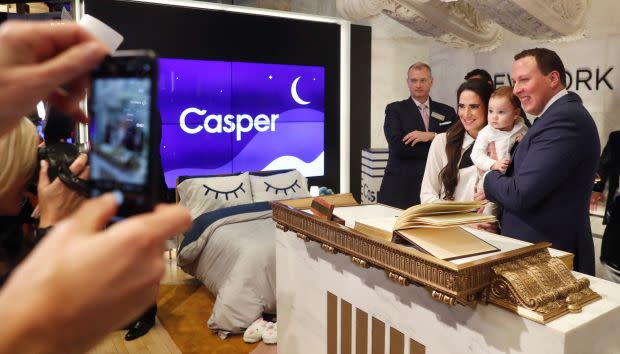When did selling mattresses become a tech business?

Casper was a unicorn to private investors. To the public markets, it is only about a third of one.
Casper Sleep Inc., a self-described “pioneer of the Sleep Economy,” started trading last week on the New York Stock Exchange. The company priced its shares at $12, the low end of a range it had already cut from an initial $17 to $19. On its first day of trading, Casper gained 12.5%. On its second, it fell 18%.
Despite what Casper says in its prospectus—that it brings “the benefits of cutting-edge technology, data, and insights directly to consumers,” that it is on the “cutting edge of sleep innovations,” that it has an app—Casper is not a technology business. It’s a sleek, direct-to-consumer company that smartly realized buying a mattress is an awful experience that could be made a little less awful with online purchases, free delivery, and free trials. It’s a middleman that sources its mattresses from a small number of manufacturers, at least one of whom also makes mattresses for Casper’s many competitors.
Selling mattresses is not a technology business, but Casper was clever. It wrapped itself in the trappings of tech startupdom—data, an app, subway codes, podcast ads!—and used that to raise tech-startup money at tech-startup valuations. Casper raised more than $300 million at a valuation of over $1 billion, a bona fide startup unicorn.
Of course, Casper did resemble a tech startup in one way: its losses. Casper lost money in every quarter it disclosed results for in its IPO prospectus. In the first three quarters of 2019, Casper lost $67 million on $312 million in revenue. It spent $114 million on sales and marketing. From the first three months of 2018 to the same period in 2019, Casper’s sales and marketing expense grew faster in percentage terms than its revenue.
Selling private investors on big dreams and bigger losses was the model du jour for much of the past decade. It boosted companies like Uber, Lyft, Postmates, DoorDash, and WeWork. Any of these companies could arguably be better classified as something other than tech: transportation, logistics, real estate. But venture firms had capital to deploy, and they wanted to invest it in tech companies, not a logistics firm with an app.
What became clear last year, as companies like Uber and Lyft went public, and WeWork aborted, was that public markets largely weren’t buying the stories these companies and their private investors told. Uber, which priced its IPO at $45, has struggled to return to that mark since its May 2019 IPO. The stock rallied past $40 on Friday (Feb. 7) after Uber met fourth-quarter expectations and pushed up its profitability target by a full year. WeWork, still reeling from its failed IPO attempt, has hired a CEO whose background is not tech, but real estate.
It’s worth asking whether the venture capitalists who backed Casper and other companies like them believed the tech tale, or whether they simply thought someone else would. Maybe by inflating the valuation past $1 billion, they gave these companies space to fall back to reality while still making multiples on their initial investments.
Sign up for the Quartz Daily Brief, our free daily newsletter with the world’s most important and interesting news.
More stories from Quartz:
How not to steal $1.5 million: Inside an Instagram influencer’s alleged debit card scam
How an Indian state successfully fought and contained the deadly coronavirus
